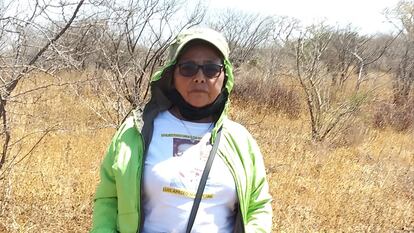Teresa Magueyal’s murder and the plight of hundreds of women in Mexico in search of their missing children
The activist’s death exposes the failure of overwhelmed authorities and the danger posed to families searching for the over 110,000 missing persons across the country


“Doña Tere’s whole life was about looking for her son, José Luis,” said a person who knew her. Teresa Magueyal was 65 years old and lived in San Miguel Octopan, a town in Celaya, in the state of Guanajuato. On Tuesday morning Doña Tere, as she was known in town, went out on her bicycle, never to return. Two men on a motorcycle shot her at point blank range and then fled. Teresa Magueyal was left for dead on the ground a few blocks from her home. Her murder reflects the horrific violence that is rocking Mexico, the failure of authorities who are overwhelmed and the danger that the relatives of the disappeared face because they are striving to find their children, their brothers and sisters, their fathers and mothers.
In Guanajuato alone, five searchers — four women and one man — have been killed since 2020. Teresa Magueyal has become the sixth, though there are countless others around the country. Every day, hundreds of mothers risk their lives with the sole purpose of finding their dead loved ones so they can bury them. Doña Tere had been searching for her son José Luis Apaseo Magueyal since 2020 — the 34-year-old disappeared in the same town where she was murdered on Tuesday.
The Prosecutor’s Office has opened an investigation to shed light on the case, while institutional condolences have poured in. However, the organizations lament that both state and federal authorities have left these families to their own fate for some time now and are not offering them any protection. “I don’t know how many more deaths they want there to be for that to happen,” said a woman from the collective who prefers not to give her name because she fears a possible backlash.
Shows of affection have also flooded the headquarters of the Una Promesa por Cumplir (A Promise to Keep) group, the organization which Teresa was a member of. “It has been extremely hard for us because Doña Tere was such a loved person in the collective and it hurts us deeply that this has happened in this way,” said a member of this association, which comprises 70 families. The people who knew her will always remember Magueyal with a smile on her face and being extremely active in her searches. “When somebody was down in the dumps, she would come in and cheer us all up,” said one of her colleagues.
Since 2019, a spike in violence in Guanajuato, the disputed territory of several cartels, has sparked a missing persons crisis of some 3,000 individuals, according to the National Registry of Missing Persons. However, civil society organizations argue that this figure is actually closer to 3,700, according to the Platform for Peace and Justice in Guanajuato. On top of this, there is the state’s current forensic crisis, with hundreds of unidentified corpses piling up in the morgues. “Guanajuato is the deadliest place in the country and certainly in the continent for female searchers,” said Raymundo Sandoval, from the aforementioned Platform. “The murder of a female searcher sends a message to the rest to abandon their efforts,” he added.
This fear is echoed by all the searching mothers in Mexico — many of whom are under constant threat of death and have been compelled to move away from their homes. “We’re afraid we’ll become just another statistic,” said Ceci Flores, who is looking for two of her children who disappeared in Sinaloa and Sonora. “We have to do the work ourselves because we encounter apathy, insensitivity and bureaucracy from authorities who do not do their jobs,” added the activist, who heads the Madres Buscadoras de Sonora (Sonora Searching Mothers) collective. “We know that we are risking our lives, but the moment we lost our children, we also lost our lives and all that remains is to continue the search for them,” she said.
To date the perpetrators of Teresa Magueyal’s murder remain unknown, but the organizations are not ruling out the possibility that it may have been committed with the consent of police forces, which further complicates the investigations. “Local and state police in several municipalities often collaborate with organized crime and sometimes even prevent searches,” explained Raymundo Sandoval. Teresa’s collective condemned the attack and is calling for justice. “This should not go unpunished and it must not happen again to anyone. Families are already enduring a painful process with the disappearance of their loved ones and now the fear of being murdered has become even worse,” said a member of Una Promesa Por Cumplir. The murder has also been roundly condemned by the office in Mexico of the United Nations High Commissioner for Human Rights (UN-HCHR), which urgently called for a stop to these types of murders and stressed that the authorities are obliged to “provide victims with protection and security.”
The collective complains that the searching mothers have been completely abandoned by federal and state authorities. “We are tired of asking for help, of marches demanding that the government protect the female searchers, but nothing has been done,” said a colleague of Teresa Magueyal. This feeling of desperation is also shared by the Platform for Peace and Justice. “Since 2021, we have been asking the federal agency for a protection plan for the female searchers, but we have been ignored. We requested a meeting with the Secretary of the Interior, Adán Augusto López, and the Deputy Secretary of Human Rights, Alejandro Encinas, but we have also been ignored. The governor of Guanajuato, Diego Sinhue, has also failed to provide protection,” explained Sandoval.
During 2022, other searching mothers were murdered in Mexico. In Morelos, Ana Luisa Garduño was killed while trying to find her daughter. Aranza Ramos, from Sonora, was searching for her husband when she was shot to death. In Sinaloa, Rosario Rodriguez Barraza was kidnapped and murdered after attending a mass in honor of her missing son. Blanca Esmeralda Gallardo was trying to find her daughter, Betzabé, who was kidnapped by a trafficking ring in Tlaxcala, and she died on the very same spot where her daughter had disappeared, in the state of Puebla. Finally, María Carmela Vázquez was in search of her son and was murdered just a few steps away from her home. “I believe that there is a point where the murderers of our children become afraid of being caught and that’s why they kill us,” added Ceci Flores, who was also on the receiving end of death threats two years ago.
In total, there are currently in excess of 110,000 missing persons in Mexico. In the face of a crisis of this magnitude, the authorities are inundated and the only resort left for the families is to go out and search for their sons and daughters themselves. This means risking their lives, without stopping until they find one little clue, a piece of bone, an empty skeleton that will give them the faintest hope of finding their bodies. “We’ll keep working,” they assured at Una Promesa Por Cumplir. “Now it is our mission to find Doña Tere’s son and to demand justice so that her murder will not go unpunished.”
Sign up for our weekly newsletter to get more English-language news coverage from EL PAÍS USA Edition
Tu suscripción se está usando en otro dispositivo
¿Quieres añadir otro usuario a tu suscripción?
Si continúas leyendo en este dispositivo, no se podrá leer en el otro.
FlechaTu suscripción se está usando en otro dispositivo y solo puedes acceder a EL PAÍS desde un dispositivo a la vez.
Si quieres compartir tu cuenta, cambia tu suscripción a la modalidad Premium, así podrás añadir otro usuario. Cada uno accederá con su propia cuenta de email, lo que os permitirá personalizar vuestra experiencia en EL PAÍS.
¿Tienes una suscripción de empresa? Accede aquí para contratar más cuentas.
En el caso de no saber quién está usando tu cuenta, te recomendamos cambiar tu contraseña aquí.
Si decides continuar compartiendo tu cuenta, este mensaje se mostrará en tu dispositivo y en el de la otra persona que está usando tu cuenta de forma indefinida, afectando a tu experiencia de lectura. Puedes consultar aquí los términos y condiciones de la suscripción digital.








































